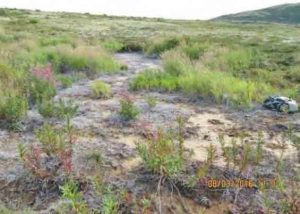
In a surprise decision on Wednesday, the Corps of Engineers abruptly denied a permit for the southwestern Alaska gold and copper mega-mine. The Corps determined that “the applicant’s plan for the discharge of fill material does not comply with Clean Water Act guidelines” and concluded that “the proposed project is contrary to the public interest.”
In August the Corps said that because of the environmental impacts of the mine on the Bristol Bay watershed, the project shouldn’t move forward.
Today’s decision was met with praise and agreement from all corners, Washington state’s Senator, Maria Cantwell said in a statement, “The science is clear: the Pebble Mine could have destroyed the Bristol Bay ecosystem and the millions of wild salmon that depend on it. So I’m pleased but not surprised the Corps finally denied the permit for this ill-conceived megaproject. I look forward to working with the incoming administration and the Alaska delegation to establish permanent protections for Bristol Bay and promote more sustainable economic opportunities for the local communities living around these irreplaceable lands. Healthy salmon runs are the backbone of our fishing and outdoor economy throughout the region, and we must do everything we can to protect it.”
The Bristol Bay area is home to one of the largest salmon fisheries in the world and supports a vast number of fishermen in Alaska and Washington state and 25 tribal communities in the region with its hundreds of miles of streams and 3,000 acres of wetlands.
Bristol Bay Tribes are celebrating today’s decision after years of opposing the project and calling for permanent protections for the Bristol Bay ecosystem. President of the United Tribes of Bristol Bay, Robert Heyano released a statement, saying, “The people of Bristol Bay have long known that our home is no place for a mine like Pebble. Today, we celebrate the appropriate action taken by the USACE in finally acknowledging this underlying truth: Pebble’s proposal is too toxic for our region and cannot be built without devastating the environment that sustains our cultures and communities. But our work is not done. We will continue to advocate for permanent protections for Bristol Bay until we are sure that our pristine lands and waters will remain intact for our children’s children and all future generations. A big quyana to all those who have worked to stop this toxic project and to those who will continue to fight for Bristol Bay.”
Speaker of the Alaska House, Bryce Edgmon, of the district said in a statement, “I strongly support resource development in Alaska but adamantly believe projects should be done the right way. That requires meaningful local engagement and buy-in. We thank Senators Lisa Murkowski and Dan Sullivan and others within the federal government for standing up for Bristol Bay against the proposed Pebble Mine.”
Kodiak Island’s Representative, Louise Stutes said, ““It’s nice to see such an important decision from the federal government in response to the broad recognition of the value of the Bristol Bay’s pristine wilderness and world-class salmon fishery to Alaska, the United States, and the world.”
Pleased with today’s decision, Executive Director of the Alaska Wilderness League, said,
“The Pebble Mine was always the wrong mine in the wrong place. The fact that President Trump resurrected and promoted it prior to the U.S. Army Corps of Engineers ultimately denying the permit isn’t worth dwelling on. What matters today is that the world’s most productive salmon fisheries are safer and the tribes, fisherman and communities that depend on a healthy Bristol Bay can breathe a sigh of relief.
“The credit for this victory belongs not to any politician but to Alaskans and Bristol Bay’s Indigenous peoples, as well as to hunters, anglers and wildlife enthusiasts from all across the country who spoke out in opposition to this dangerous and ill-conceived project. We can be thankful that their voices were heard, that science counted and that people prevailed over short-term profiteering.”
“Even the Trump administration had to conclude that this destructive open-pit mine would have done irreparable damage to the Bristol Bay watershed,” said Marc Fink, a senior attorney at the Center for Biological Diversity. “The Corps’ decision is a huge victory for wild salmon, the Iliamna lake seal, and other imperiled wildlife that call this spectacular place home.”
National Wildlife Federation applauded today’s decision, saying, “Bristol Bay is a pristine international ecological treasure and today’s decision will ensure that it remains that way,” said Collin O’Mara, president and CEO of the National Wildlife Federation. “We are grateful to the administration and the Army Corps of Engineers for defending one of the world’s most important salmon fisheries and the tens of thousands of jobs it supports.”
